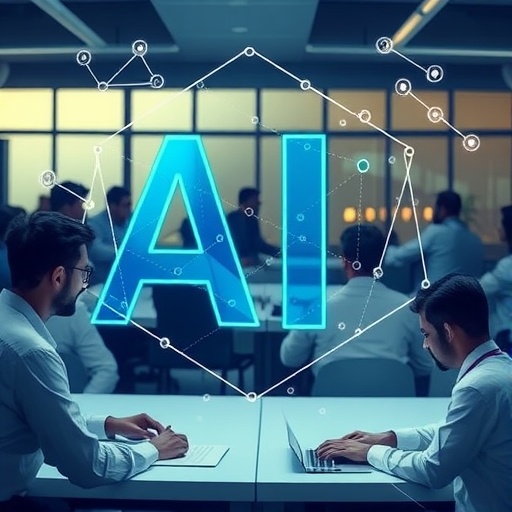In recent years, the intersection of artificial intelligence (AI) and higher education has become an increasingly important topic, particularly in the context of campus hiring. A groundbreaking study conducted by Rukadikar and Khandelwal explores the perceptions of Indian graduates regarding the efficacy of AI tools used during the recruitment process. As universities and corporations alike embrace technological advancements, understanding how these innovations are viewed by prospective employees is crucial for shaping future hiring practices.
The study, published in the journal Discover Artificial Intelligence, sheds light on the ways AI is transforming the landscape of recruitment. Traditionally, the hiring process has relied heavily on human judgment, often leading to biases and inconsistencies. With AI technology entering the arena, there is potential for a more objective evaluation of candidates based on data-driven assessments. This shift raises a fundamental question: Do graduates believe that AI can offer a fair and efficient means of evaluation in campus hiring?
Rukadikar and Khandelwal employed a mixed-methods approach to investigate the topic, utilizing surveys and in-depth interviews among recent graduates. The findings reveal a complex interplay of optimism and skepticism among Indian graduates regarding AI-enabled hiring systems. While many appreciate the potential for reducing bias and expediting the hiring process, concerns around algorithm transparency and the loss of human touch remain prevalent.
One of the pivotal insights gleaned from the research is the necessity for candidates to understand the algorithms driving AI assessments. Graduates expressed unease when they felt they were being evaluated by a “black box” that lacked accountability. This sentiment highlights the pressing need for organizations to educate candidates on how AI tools function, thereby enhancing transparency and fostering trust.
Additionally, the study unveiled a generational divide in perceptions toward AI in hiring. Younger graduates tend to be more accepting of algorithm-driven processes, viewing them as a natural evolution in hiring. In contrast, older candidates expressed a preference for traditional methods, underscoring the need for employers to strike a balance between innovation and established practices to accommodate various demographics.
The use of AI not only raises questions of effectiveness but also scales to concerns about the very nature of employment itself. As AI systems become more prevalent in campus hiring, there is a fear of dehumanizing the process, transforming potential job seekers into mere data points in an algorithm. This concern resonates deeply with candidates who value personal interaction and rapport during interviews, further complicating the discourse surrounding AI integration.
In light of these findings, the study advocates for a collaborative approach where AI tools are used to supplement, rather than supplant, human judgment in the hiring process. The authors suggest that organizations employ hybrid models that incorporate both AI assessments and human insights to create a more holistic evaluation framework. In essence, the goal is to harness the strengths of both AI and human intuition, thereby ensuring that candidates are not only assessed on qualifications but also on their unique potential.
Moreover, the research highlights the importance of continuous feedback and adaptation in AI-driven hiring systems. Graduates emphasized the value of iterative improvements based on real-world performance data, advocating for a dynamic approach where AI models learn from outcomes to refine their algorithms continuously. Such adaptability could increase the efficacy of hiring processes and bolster graduate confidence in AI technology.
The exploration of AI’s role in campus hiring intersects with broader societal issues such as inclusivity and diversity. Many graduates articulated a desire for AI tools to promote equitable hiring practices by leveraging data to identify and eliminate biases. The challenge, however, lies in ensuring that the algorithms themselves are not inherently biased—a risk that has been documented in various studies. Therefore, ongoing vigilance and socio-ethical considerations must accompany the deployment of AI in recruitment.
Additionally, the authors note that organizations must consider the implications of AI-driven hiring on employers. While AI can expedite processes and reduce costs, companies must also be mindful of the implications on brand image and candidate experience. Graduates expect employers to prioritize ethical recruitment practices, and any negative perceptions surrounding AI applications can have long-term repercussions on talent attraction and retention.
As higher education institutions prepare students for the future job market, the findings of this study prompt an essential dialogue on how programs can better equip graduates to thrive in an AI-enhanced environment. Curriculum reforms may be necessary to shed light on the workings of AI technologies, providing students with the knowledge they need to navigate the complexities of future hiring landscapes confidently.
In conclusion, the study by Rukadikar and Khandelwal serves as a vital contribution to understanding the perspectives of Indian graduates on AI in campus hiring. Their work reveals that while there is a willingness to embrace technological advancements, concerns about transparency, bias, and the human element persist. By addressing these issues collaboratively, stakeholders can work toward a future where AI enhances the hiring process rather than replaces it, fostering an environment in which opportunities are accessible to all graduates.
As the discourse surrounding AI and recruitment continues to evolve, it is clear that further exploration is needed to grasp its full impact on higher education and the labor market. Rukadikar and Khandelwal’s findings open up avenues for research that will explore these themes across various cultural contexts, ultimately contributing to a more comprehensive understanding of the role of technology in shaping the future of work.
Subject of Research: Perceptions of Indian graduates on the effectiveness of AI in higher education campus hiring.
Article Title: Exploring perceptions of Indian graduates on the effectiveness of artificial intelligence in higher education campus hiring.
Article References:
Rukadikar, A., Khandelwal, K. Exploring perceptions of Indian graduates on the effectiveness of artificial intelligence in higher education campus hiring.
Discov Artif Intell 5, 265 (2025). https://doi.org/10.1007/s44163-025-00526-z
Image Credits: AI Generated
DOI: 10.1007/s44163-025-00526-z
Keywords: Artificial Intelligence, Campus Hiring, Higher Education, Graduate Perceptions, Recruitment Practices.




